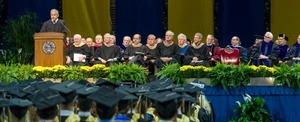‘Defy expectations’: Javier Palomarez exemplifies his Mendoza commencement message
Published: May 28, 2014 / Author: Christine Cox

Javier Palomarez was only 3 years old when his mother moved him
and his nine siblings from Texas to northwest Indiana, just south of the
University of Notre Dame. They were migrant workers picking crops by hand and
living in a one-room shack with no running water.
On May 17, nearly 50 years later, Palomarez returned to the region
as the commencement speaker for the Mendoza College of Business Graduate
Ceremony. VIDEO
“I have to tell you just how surreal it is on a personal level for
me to be standing before you here today,” he told the 427 business master’s
candidates in the Joyce Center’s Purcell Pavilion. “How could I have ever
dreamed, growing up as I did, a former high school dropout learning English as
a second language … that I would find myself addressing one of the world’s
premier institutions of higher learning?”
But Palomarez, president and CEO of the U.S. Hispanic Chamber of
Commerce (USHCC) and former marketing executive for Sprint Inc. and Allstate Insurance
Corporation among others, called his humble beginnings a blessing: “I learned
the dignity of a hard day’s work, the importance up constantly setting and
achieving goals, the inherent value of serving others and the need to honor my
responsibilities.”
His life’s blessings inspired him to help others, especially
through the USHCC, which represents 3.2 million Hispanic-owned firms, $468
billion in economic contribution to the U.S. economy and more than 219 American
corporations. “We never forget that we are first and foremost American
businesses, and every tax bill that we pay, every job we create, every product
we manufacture and every single service we provide goes to benefit the greatest
economy in the world.”
Additionally, the USHCC partners with Mendoza’s Nonprofit
Executive Programs to provide executive education to leaders of Hispanic
chambers of commerce across the country.
Palomarez called on the graduates to “defy
expectations and prove to the world that today’s Millennials are our greatest
hope and tomorrow’s greatest generation.” He outlined three life lessons to
help them fulfill their promise.
The first was to remember the basics. “In today’s big business
lexicon everyone invites you to revolutionize, to reinvent, to innovate, to
think outside the box, to basically to set the world on fire,” he said. But he
warned against seeking immediate gratification and overnight acclaim. “Learn
your business first; be patient in the development of your life and your career,”
he said. “We need to spend time developing our skills. Unlike exams … we can’t
cram our way to lifelong and sustainable success.”
The second lesson was to make a difference. “I’m talking about truly
dedicating part of your professional life to contributing meaningfully,” he
said. “Always remember that anywhere you are, you have the power to influence
those around you, to inspire others.”
Finally, he told the business students to never measure wealth in
dollars. “An individual’s wealth should be measured by the lives that she
touches, the impacts of her contributions and the legacy that she creates,” he
said. “Never forget that the weight of your name is heavier than all of the
gold that you can amass.”
In closing, he told the graduates that “in true Notre Dame spirit,
remember to fight for your dreams, seize the future and commit your lives to
something truly exceptional and bigger than yourself.”
In the undergraduate business commencement ceremony on May 18 in
the Joyce Center’s North Dome, Roger D. Huang, the Martin J. Gillen Dean for
the Mendoza College, gave a parallel message to 643 students. Huang encouraged
the graduates to embrace the mission of service of the College and University
and to become servant leaders.
“Servant leaders first
and foremost recognize that whatever resources are given into their hands—the lives
of their employees, whatever wealth or assets the company has acquired, the
customers and shareholders—are not theirs to possess,” he said. “They are to be
stewards, mere stewards, dedicated to a philosophy that says, ‘I am responsible
for the lives of those around me. I am responsible for their welfare and that
of my customers and stakeholders. I am responsible to the world.’”
Huang pointed out
biblical roots of servant leadership in the book of Matthew when Jesus explains
that the true purpose of his earthly incarnation was to serve, not to be
served. He then spoke about Pope Francis’s recent attention to the topic. “Many
news outlets ran headlines about the pope excoriating capitalism,” Huang said. “But
take a closer and deeper look, and you find he is urging people away from
business as consumerism, to transformational vision of business as a force for
good. He states, ‘Business is, in fact, a vocation, and a noble vocation,
provided that those engaged in it see themselves challenged by a greater meaning
in life.’”
Finally, Huang spoke of
Mendoza’s founding dean, the Rev. John Cardinal O’Hara, and how he built the
College upon the notions of servant leadership, especially through his often
quoted passage, “The primary function
of commerce is service to mankind.”
In closing, Huang urged
the departing graduates to keep the lessons of servant leadership in mind and
heart, no matter their path. “Servant leadership does not require a big
executive title. It doesn’t require that you command billion dollar budgets,”
he said. “It only requires an attitude that says, ‘I accept the responsibility
to serve.’”
/news_and_events/news_articles/article/14353/defy-expectations-javier-palomarez-exemplifies-his-mendoza-commencement-mes




